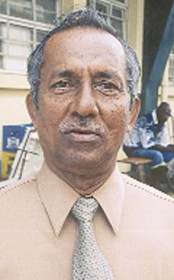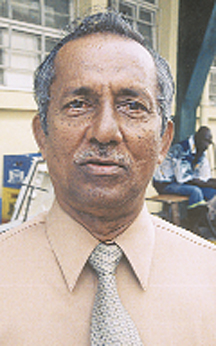-says donors must do more for transparency
PNCR-1G MP Winston Murray is advocating a code to guide the conduct of ministers, as part of a concerted approach to rein in what he described as rampant corruption within government.

At a symposium on “Financial Accountability and Good Governance,” held at City Hall on Wednesday evening, Murray also urged international donors as well as civil society to make stronger demands for transparency and accountability, describing them as pillars of good governance.
Murray, the Shadow Finance Minister, said the corruption prevails at all levels of society, and despite an abundance of evidence the authorities do nothing. He cited several prominent corruption cases. He contended that the most persistent fraud is the siphoning off of financial resources through the government’s capital expenditure budget. He said “a prominent government operative,” whom he declined to identify, estimated that approximately “20% of all capital expenditure” is illegally diverted from the projects for which it was intended, both robbing and burdening taxpayers. “You can judge for yourself where Guyana sits at this point in time in relation to those yardsticks to measure governance,” he noted.
Murray said in some countries there are written codes of conduct for public officials, including ministers, to ensure responsibility. He pointed to Australia, where ministerial guidelines demand that office holders accept responsibility after wrong doing or failures within their administrations. “You have to resign,” he explained, while urging, “Let us have a code that is made public, that could bring people to accountability when wrong is committed.”
The problem, Murray explained, occurs often when ministers who are politicians seek to act outside of the framework of financial regulations. “They think they can bend or in some cases break or evade these regulations,” he noted. In Canada, he said, the Public Accounts Committee has outlined procedures that must be followed where an accounting officer-the equivalent of a permanent secretary-disagrees with a minister over expenditure. The Canadian procedures call for the accounting officer to inform ministers if there are objections to any course of action. In the event that the minister still wishes to proceed, the officer sets out any objections in a letter to minister, stating the reasons for objections. Further, the officer also has a duty to notify both the auditor general and the controller general. If the minister insists on proceeding, they are then required to instruct the officer in writing and copies of the instructions would be sent to the auditor general and the controller general.
According to Murray, the adoption of such procedures could ensure “the poor public servant is not made the scapegoat” for what occurs under his/her watch. During a Q&A session after Murray’s presentation, former Foreign Affairs Minister Rashleigh Jackson noted late former President Desmond Hoyte had drafted and circulated a letter to permanent secretaries, setting out how they should behave with ministers. He suggested that the letter could be drawn to President Bharrat Jagdeo’s attention, to help officials better understand their relationships. Murray further suggested that such procedures could also apply to transactions between ministers, citing the case of a $4B supplementary appropriation secured by the Housing Ministry earlier in the year, but subsequently charged to last year’s accounts. Murray dubbed the situation a “brazen illegality” for which the government has still not answered. He said with a code, there would be a paper trail. “…When the time comes for accountability, we can find out who the real culprits are and necessary action could be taken,” he said.
Meanwhile, Murray also challenged international lenders and the donor community to make stronger demands for good governance. He noted that they have to balance the recognition of a country’s sovereignty with their right to know what is happening with the funds they have loaned for development. However, he explained that there are instances where donor territories, like Norway and Lichtenstein, have put out guidelines on good governance and anti-corruption, stating procedures expected to be implemented so that the public could voice concerns over possible mismanagement and corruption. “Is that too much to ask? Is that crossing the divide [of] this imaginary line that they not want to cross? I suggest no,” Murray said. Further, he noted that financial assistance comes from taxpayers in the donor countries and an interest in the propriety of expenditure could hardly be deemed out of place. “I make bold to say that I believe some of our financial institutions and friendly donor countries shy away from taking that on,” he added.
Murray highlighted the need for civil society and the private sector to assume more activist roles. He pointed to the involvement of civil society organisations, including NGOs, in the national monitoring process in other countries. “They are saying that the private sector, NGOs, [and] civil society could be vanguards in this process,” he said, adding, “Of course, it is my personal view and I say this quietly, that they are timid. The sycophants are busy protecting and expanding their personal turf while the really concerned and worried look only to the political parties to fight the battle for fear of reprisals or loss of some concession or the other.”
He empathised with the dilemma but said unless there is concerted action change would not come.
The public ultimately carries the burden of corruption, Murray reminded, and he added that good governance strengthens and sustains legitimacy and enhances the public well-being, while poor governance does the opposite. In this regard, political renewal, he suggested, may be needed for better governance. “For so long as the body politic continues to accept through ethnic lenses the actions of those who govern, then for that long we run the risk of more of the same, with the prospect of real development, fulfilling lives and more secure living becoming an increasingly elusive dream,” he said. “It is up to all of us to determine whether we have reached the point when and where we will assess those who govern us on the basis of their quality of governance. That’s the issue for us! Have we reached the point of maturity in our lives and living in Guyana, where we can assess them on the basis of their quality of their governance? That is the ultimate and most potent assessment and judgement that citizens can make and act on. I don’t know what the answer is.”
The symposium was hosted by the PNCR’s Meadow Brook Group. It is one in a series of activities planned to seek discussion on issues important to the people.

